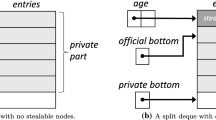Abstract
For many years, Herlihy’s elegant computability-based Consensus Hierarchy has been our best explanation of the relative power of various objects. Since real multiprocessors allow the different instructions they support to be applied to any memory location, it makes sense to consider combining the instructions supported by different objects, rather than considering collections of different objects. Surprisingly, this causes Herlihy’s computability-based hierarchy to collapse. In this paper, we suggest an alternative: a complexity-based classification of the relative power of sets of multiprocessor synchronization instructions, captured by the minimum number of memory locations of unbounded size that are needed to solve obstruction-free consensus when using different sets of instructions.

Similar content being viewed by others
References
Afek, Y., Attiya, H., Dolev, D., Gafni, E., Merritt, M., Shavit, N.: Atomic snapshots of shared memory. J. ACM 40(4), 873–890 (1993)
Aspnes, J., Attiya, H., Censor-Hillel, K.: Polylogarithmic concurrent data structures from monotone circuits. J. ACM 59(1), 2:1–2:24 (2012)
Aspnes, J., Ellen, F.: Tight bounds for adopt-commit objects. Theory Comput. Syst. 55(3), 451–474 (2014)
Aspnes, J., Herlihy, M.: Fast randomized consensus using shared memory. J. Algorithms 11(3), 441–461 (1990)
Attiya, H., Welch, J.L.: Distributed Computing: Fundamentals, Simulations, and Advanced Topics, 2nd edn. Wiley, Hoboken (2004)
Bouzid, Z., Raynal, M., Sutra, P.: Anonymous obstruction-free \((n, k)\)-set agreement with \(n-k+1\) atomic read/write registers. Distrib. Comput. 31(2), 99–117 (2018)
Bowman, J.R.: Obstruction-free snapshot, obstruction-free consensus, and fetch-and-add modulo k. Technical report TR2011-681, Computer Science Department, Dartmouth College (2011). http://www.cs.dartmouth.edu/reports/TR2011-681.pdf
David, M.: Wait-free linearizable queue implementations. Master’s thesis, University of Toronto (2004)
David, M., Brodsky, A., Fich, F.E.: Restricted stack implementations. In: Proceedings of the 19th International Conference on Distributed Computing, (DISC), pp. 137–151 (2005)
Ellen, F., Gelashvili, R., Shavit, N., Zhu, L.: A complexity-based hierarchy for multiprocessor synchronization:[Extended Abstract]. In: Proceedings of the 35th ACM Symposium on Principles of Distributed Computing, (PODC), pp. 289–298 (2016)
Ellen, F., Gelashvili, R., Zhu, L.: Revisionist simulations: a new approach to proving space lower bounds. In: Proceedings of the 37th ACM Symposium on Principles of Distributed Computing, (PODC), pp. 61–70, (2018)
Fich, F., Herlihy, M., Shavit, N.: On the space complexity of randomized synchronization. J. ACM 45(5), 843–862 (1998)
Fich, F.E., Luchangco, V., Moir, M., Shavit, N.: Obstruction-free algorithms can be practically wait-free. In: Proceedings of the 19th International Conference on Distributed Computing, (DISC), pp. 78–92, (2005)
Gelashvili, R.: On the optimal space complexity of consensus for anonymous processes. Distrib. Comput. 31(4), 317–326 (2018)
Gelashvili, R., Keidar, I., Spiegelman, A., Wattenhofer, R.: Brief announcement: Towards reduced instruction sets for synchronization. In: Proceedings of the 31st International Conference on Distributed Computing, (DISC), pp. 53:1–53:4 (2017)
Giakkoupis, G., Helmi, M., Higham, L., Woelfel, P.: An \(\cal{O}(\sqrt{n})\) space bound for obstruction-free leader election. In: Proceedings of the 27th International Symposium on Distributed Computing, (DISC), pp. 46–60 (2013)
Guerraoui, R., Ruppert, E.: Anonymous and fault-tolerant shared-memory computing. Distrib. Comput. 20(3), 165–177 (2007)
Herlihy, M.: Wait-free synchronization. ACM Trans. Program. Lang. Syst. (TOPLAS) 13(1), 124–149 (1991)
Herlihy, M., Ruppert, E.: On the existence of booster types. In: Proceedings of the 41st Annual IEEE Symposium on Foundations of Computer Science, (FOCS), pp. 653–663, (2000)
Herlihy, M., Shavit, N.: The Art of Multiprocessor Programming. Elsevier, Amsterdam (2012)
Intel: Transactional Synchronization in Haswell, (2012). http://software.intel.com/en-us/blogs/2012/02/07/transactional-synchronization-in-haswell
Jayanti, P.: Robust wait-free hierarchies. J. ACM 44(4), 592–614 (1997)
Jayanti, P., Tan, K., Toueg, S.: Time and space lower bounds for nonblocking implementations. SIAM J. Comput. 30(2), 438–456 (2000)
Khanchandani, P., Wattenhofer, R.: On the importance of synchronization primitives with low consensus numbers. In: Proceedings of the 19th International Conference on Distributed Computing and Networking, (ICDCN), pp. 18:1–18:10, (2018)
Lo, W.-K., Hadzilacos, V.: All of us are smarter than any of us: nondeterministic wait-free hierarchies are not robust. SIAM J. Comput. 30(3), 689–728 (2000)
Perrin, M.: Spécification des objets partagés dans le systèmes répartis sans attente (specification of shared objects in wait-free distributed systems). Ph.D. thesis, University of Nantes, France (2016)
Perrin, M., Mostéfaoui, A., Jard, C.: Causal consistency: beyond memory. In: Proceedings of the 21st ACM SIGPLAN Symposium on Principles and Practice of Parallel Programming, (PPOPP), pp. 26:1–26:12, (2016)
Raynal, M.: Concurrent Programming: Algorithms, Principles, and Foundations. Springer, Berlin (2012)
Ruppert, E.: Determining consensus numbers. SIAM J. Comput. 30(4), 1156–1168 (2000)
Schenk, E.: The consensus hierarchy is not robust. In: Proceedings of the 16th Annual ACM Symposium on Principles of Distributed Computing, (PODC), pp. 279, (1997)
Taubenfeld, G.: Synchronization Algorithms and Concurrent Programming. Pearson Education, London (2006)
Zhu, L.: Brief announcement: tight space bounds for memoryless anonymous consensus. In: Proceedings of the 29th International Conference on Distributed Computing, (DISC), pp. 665, (2015)
Zhu, L.: A tight space bound for consensus. In: Proceedings of the 48th Annual ACM Symposium on Theory of Computing, (STOC), pp. 345–350, (2016)
Acknowledgements
The authors would like to thank Yehuda Afek, Dan Alistarh, Michael Coulombe, Eli Gafni, Petr Kuznetsov, and Philipp Woelfel for helpful conversations and feedback. Part of this work was performed when Rati Gelashvili was a Ph.D. student at MIT. Support is gratefully acknowledged from the Natural Science and Engineering Research Council of Canada (NSERC) under Discovery Grant RGPIN-2015-05080 and a Postgraduate Scholarship, a University of Toronto Faculty of Arts and Science Postdoctoral Fellowship, the National Science Foundation under grants CCF-1217921, CCF-1301926, and IIS-1447786, the Department of Energy under grant ER26116/DE-SC0008923, and SUN Microsystems, Oracle and Intel corporations. A preliminary version of this paper appeared in [10].
Author information
Authors and Affiliations
Corresponding author
Additional information
Publisher's Note
Springer Nature remains neutral with regard to jurisdictional claims in published maps and institutional affiliations.
Rights and permissions
About this article
Cite this article
Ellen, F., Gelashvili, R., Shavit, N. et al. A complexity-based classification for multiprocessor synchronization. Distrib. Comput. 33, 125–144 (2020). https://doi.org/10.1007/s00446-019-00361-3
Received:
Accepted:
Published:
Issue Date:
DOI: https://doi.org/10.1007/s00446-019-00361-3




